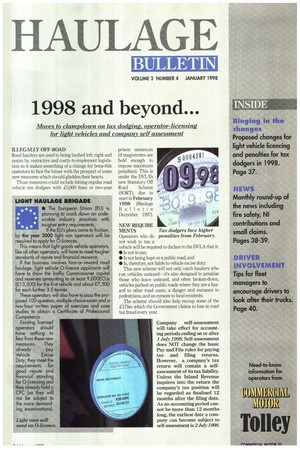HAULAGE
Page 39

If you've noticed an error in this article please click here to report it so we can fix it.
BULLETIN
VOLUME 2 NUMBER 4 JANUARY 1998
1998 and beyond...
Moves to clampdown on tax dodging, operator-licensing for light vehicles and company self assessment ILLEGALLY OFF-ROAD Road hauliers are used to being bashed left, right and centre by restrictive and costly-to-implement legislation so it makes something of a change for bona-fide operators to face the future with the prospect of some new measures which should gladden their hearts.
Those measures could include hitting regular road vehicle tax dodgers with £5,000 fines or two-year
LIGHT HAULAGE BRIGADE
• The European Union (EU) is planning to crack down on undesirable industry practices with tougher entry requirements. if the EU's plans come to fruition, by the year 2000 light van operators will be required to apply for 0-licences.
This means that light goods vehicle operators, like all other operators, will have to meet tougher standards of repute and financial resource. If the business involves hire-or-reward road haulage, light vehicle 0-licence applicants will have to show the Traffic Commissioner capital and reserves amounting to at least 9,000ECUs (£13,500) for the first vehicle and about £7,500 for each further 3.5-tanner.
These operators will also have to pass the proposed 100-question, multiple-choice exam and a two-hour written paper of exercises and case studies to obtain a Certificate of Professional Competence. Existing licensed operators should have nothing to fear from these new measures. They already pay Vehicle Excise Duty; they meet the requirements for good repute and financial standing for 0-licensing and they already hold a CPC (so they will not be subject to the more demanding examinations).
prison sentences (if magistrates are bold enough to impose maximum penalties). This is under the DVLA's new Statutory Off Road Scheme (SORT), due to start in February 1998 (Haulage Bulletin December 1997). LVOV
L.12
NEW REQUIRE AA MENTS Tax dodgers face higher Operators who do penalties from February. not wish to tax a vehicle will be required to declare to the TATA that it • Is not in use; • Is not being kept on a public road; and • Is, therefore, not liable to vehicle excise duty.
This new scheme will not only catch hauliers who run vehicles untaxed—it's also designed to penalise those who leave untaxed, and often broken-down, vehicles parked on public roads where they are a hazard to other road users, a danger and nuisance to pedestrians, and an eyesore to local residents.
The scheme should also help recoup some of the £175m which the Government claims to lose in road tax fraud every year.
Company self-assessment will take effect for accounting periods ending on or after 1July 1999. Self-assessment does NOT change the basic Pay and File rules for paying tax and filing returns. However, a company's tax return will contain a selfassessment of its tax liability. Unless the Inland Revenue inquires into the return the company's tax position will be regarded as finalised 12 months after the filing date. As an accounting period cannot be more than 12 months long, the earliest date a company can become subject to self-assessment is 2 July 1998.
































































































